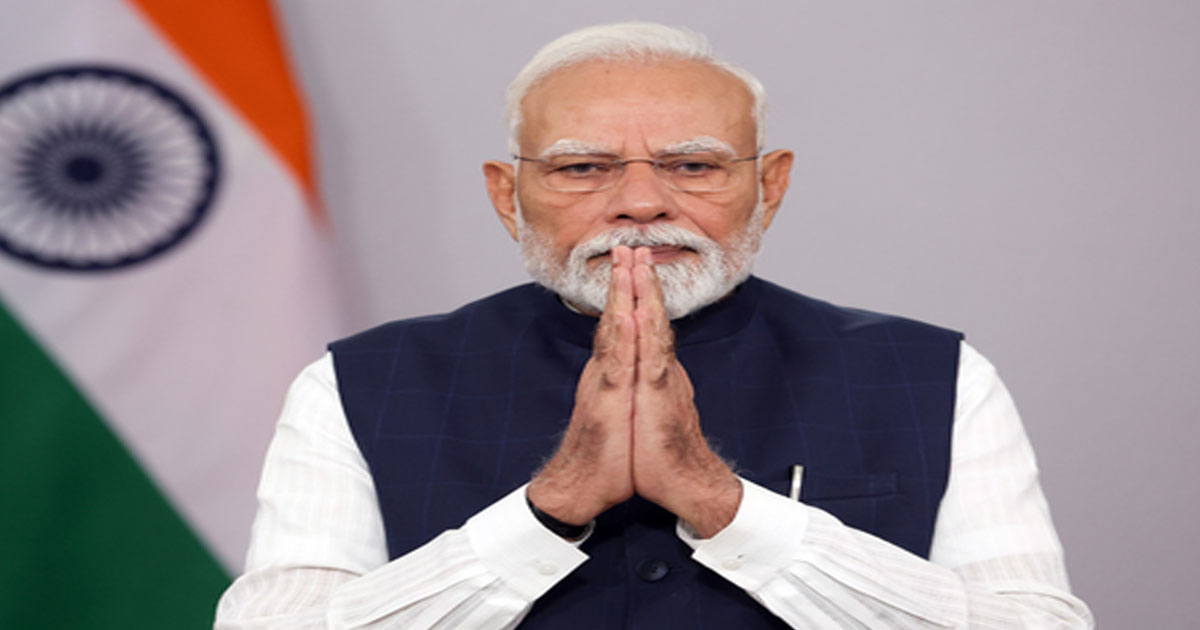Politics
Caste count goes official: BJP seizes agenda; INDIA bloc faces strategic recalibration

New Delhi, April 30: In a landmark decision with far-reaching social and political implications, Prime Minister Narendra Modi-led government has approved the inclusion of caste enumeration in the upcoming national Census. The announcement, made by Union Minister Ashwini Vaishnaw following a meeting of the Cabinet Committee on Political Affairs (CCPA) on Wednesday, comes amid growing political momentum around caste data and its role in public policy.
Vaishnaw, addressing the media, termed the decision as both a corrective measure and a governance reform, stating that while some states had already conducted caste surveys, many executed in politically motivated and non-transparent ways, leading to confusion and mistrust in society. “To preserve the integrity of our social fabric and ensure that caste enumeration is not misused for narrow political gains, it is essential to include it transparently within the formal Census process,” he said.
The Union Minister came heavily down on the Congress and its INDIA bloc allies, accusing them of exploiting the demand for a caste census purely for political leverage. He underscored that no caste enumeration has been included in any population census since India’s Independence, despite repeated demands.
Tracing the history, Vaishnaw reminded that in 2010, then Prime Minister Dr. Manmohan Singh assured the Lok Sabha that the Cabinet would consider the inclusion of caste data in the Census. A Group of Ministers was subsequently formed, and several parties recommended proceeding with caste enumeration.
However, despite this consensus, the UPA government did not carry out a caste census. Instead, it conducted a socio-economic survey, widely known as the SECC (Socio-Economic and Caste Census), which did not yield credible or usable caste data due to its flawed design and lack of official recognition.
This decision comes at a time when opposition parties, especially Rahul Gandhi and the Congress, have made the caste census a central electoral demand.
Rahul Gandhi, in particular, has used it as a consistent political weapon, frequently attacking the BJP for allegedly remaining silent on the issue. The inclusion of caste enumeration in the official Census effectively neutralises that political advantage, taking the wind out of Rahul’s sails just as Bihar gears up for Assembly elections, say observers.
In Bihar, where caste plays a defining role in electoral politics, the RJD-Congress alliance was preparing to make caste census a major campaign issue. However, with PM Modi-led government now taking ownership of the process at the national level, the opposition’s pitch risks being blunted. Political analysts suggest that this move could lead to internal churning within the INDIA bloc.
This move is more than a bureaucratic update — it is a calculated political and social repositioning. It reshapes the caste discourse, undercuts opposition narratives, and sets the stage for future policy changes rooted in real demographic data. As the Census process begins, all eyes will be on how the government handles the rollout, release, and response to caste-based findings.
But for now, the Modi government has seized the initiative on an issue that once formed the core of its opponents’ agenda — and in doing so, may have fundamentally changed the tone of the electoral debates leading up to 2025 and beyond.
The government also pointed to a precedent that reassures social stability: when the Modi government implemented 10 per cent reservation for the economically weaker sections (EWS) in the general category, it did not lead to social unrest. This, Vaishnaw argued, demonstrated the government’s ability to introduce socially sensitive reforms without disrupting the harmony of society.
By taking this politically sensitive yet constitutionally sound step, the Modi government not only positions itself as responsive and inclusive but also sends a clear message that it is willing to act on complex issues with strategic clarity rather than electoral opportunism.
Crime
Navi Mumbai Fraud: Panvel Police Arrest Couple From Pune For Duping Residents With Fake Discounted Grocery And Household Offers

Navi Mumbai: The Panvel Taluka Police have arrested a couple who allegedly cheated several people of lakhs of rupees by promising to supply groceries, clothes, and household goods at discounted rates.
The accused, identified as Nawin Dhanaji Panchal (52) and Vidya Nawin Panchal (45), were arrested from Alandi in Pune and have been remanded in police custody till October 31 by the court.
According to the police, the Panchal couple rented flats in various housing societies across Panvel, where they initially gained the trust of residents by supplying groceries and household items at wholesale prices. Once they established credibility, they lured victims with offers to start a grocery business together, collecting large sums of money.
One such complainant from Panvel was cheated of Rs 5 lakh, after which the couple switched off their phones and vacated their rented home without delivering goods or returning the money.
Following a complaint, a case was registered against the duo under relevant sections of the Indian Penal Code. Acting on technical intelligence, a police team tracked them to Alandi in Pune. Under the supervision of Senior Police Inspector Gajanan Ghadge, a team led by API Aniruddha Gije and PSI Harshal Rajput laid a trap and arrested the accused on October 27.
“During the investigation, we found that the Panchal couple used multiple mobile numbers, email IDs, and bank accounts to cheat people in the same manner in different cities. They were previously booked in similar cases in Nagpur and Kalyan and had been absconding. We suspect more victims may come forward as the probe continues,” said Senior Police Inspector Gajanan Ghadge of Panvel Taluka Police Station.
Police have appealed to citizens who may have fallen victim to the couple’s fraud to contact their nearest police station immediately.
National News
Fake news on social media adds to challenges in maintaining electoral integrity

New Delhi, Oct 31: In 2020, the Bihar Assembly election was announced even as the country was coming out of the Coronavirus pandemic and citizens were slowly stepping out of a ‘lockdown’; and when the worldwide web proved to be the most effective means of communication.
While the poll process had to be undertaken on time in keeping with the rules in a Parliamentary democracy, the Election Commission had to issue strictures on physical campaigns to adhere to health and hygiene safety protocols. As the election campaign and political outreach further increased on the internet, fraudsters sharpened their skills on the internet. Election propaganda was infiltrated with fake news meant to influence voters. Some were detected, some were not.
But as technology brought election information on mobile screens, it also introduced with it the underbelly of false and fraudulent data and content. Misinformation and disinformation on social media evolved among challenges against maintaining electoral integrity, along with money, muscle, including violations of the Model Code of Conduct. However, the Bihar election 2020 was conducted successfully against all odds.
Now, the 2025 Assembly polls will be the first among state elections to be held after the Election Commission launched a “register” for information on false and misleading information during the process, with answers to frequently asked questions. The poll body launched a “Myth vs Reality Register” on April 2, 2024, a few days ahead of the Lok Sabha polls that year. It will be updated with information with inputs from the coming exercises collected through the Commission’s monitoring sources.
However, with the advancement in technology and the vastness of the worldwide web, monitoring and sharing such fake-bursting information is time-consuming, proving difficult sometimes.
In August this year, the Election Commission dismissed news circulating on various social media platforms claiming that the poll body had suddenly removed e-voter rolls of many states from its website. The Commission added that anyone can download the electoral rolls for any of the 36 States and Union Territories through its website ‘voters.eci.gov.in’.
On October 24, the poll body released an advisory, specifying guidelines on the use of AI-generated content for election campaigning ahead of the Bihar Assembly election this year. Fake news on the internet is not recent, though the extended use of social media and video communication applications increased during the pandemic-induced lockdown.
A few years ago, researchers at the Massachusetts Institute of Technology (MIT) found that false news travels significantly faster and wider online than real news. Their findings were published in the journal Science, which revealed, “Fake news spreads faster than true news on Twitter (renamed X) – thanks to people, not bots.” It added that such posts containing falsehoods were 70 per cent more likely to be retweeted than truthful tweets.
The researchers analysed a huge dataset, comprising about 1,26,000 news cascades on X (then Twitter) that encompassed over 45 lakh tweets by around 30 lakh users between 2006 and 2017.
To ensure accuracy, the study relied on the assessments of six independent fact-checking organisations, resulting in a high degree of consensus on the veracity of the news stories.
Notably, fake news was found to be particularly prevalent in the political arena.
“Whether in India, the UK, or the United States, where social media is extensively used to reach out to a certain section of voters, you will find such misinformation and disinformation,” said Dr Sambit Pal, In-Charge Director at the International School of Broadcasting and Journalism, MIT Art, Design and Technology University, Pune.
“Fake news has become an integral part of political communication everywhere. In India, social media has been used aggressively by political parties with a dedicated IT department to microtarget voters and change the narrative. Here, many supporters misuse the process to suit their own narrative,” added Dr Pal, who is also part of the India Training Network of Google News Initiative, conducting workshops on fact-checking and fake news verification.
Business
India aims 300 million tonnes of crude steel production capacity by 2030

New Delhi, Oct 31: India aims to achieve 300 million tonnes of crude steel production capacity by 2030, Union Minister of State for Steel, Bhupathiraju Srinivas Varma, said on Friday.
In a meeting with Sara Modig, State Secretary to Minister for Energy, Business and Industry, Sweden, here, in presence of Swedish Ambassador to India Jan Thesleff and other officials, the minister highlighted India’s growing steel sector, driven by visionary leadership of Prime Minister Narendra Modi.
Notably, India’s domestic steel demand is growing at an impressive 11-13 per cent, fuelled by large-scale infrastructure projects, while global demand faces a slowdown, according to Steel Ministry.
The discussions were held to explore collaboration opportunities in the field of research and development in Green Steel production and other advanced technologies to reduce carbon emissions.
Varma reaffirmed the invitation extended to Sweden to participate in Bharat Steel 2026, an International Conference-cum-Exhibition dedicated to the steel industry, scheduled to be held on April 16–17, 2026, at Bharat Mandapam, New Delhi.
Meanwhile, the growth rate of India’s eight core industries was recorded at 3 per cent in September this year compared to the same month of the previous year, with the steel and cement sectors recording strong growth during the month, data released by the Commerce and Industry Ministry showed.
Steel production surged by a robust 14.1 per cent in September compared to the same month of the previous year on the back of increased demand from big-ticket infrastructure projects being carried out by the government. The cumulative growth of steel during April to Sept of 2025-26 increased by 11 per cent over the corresponding period of the previous year.
The government imposed a 12 per cent temporary safeguard duty on certain steel imports in April 2025 to protect the domestic market. These measures follow previous actions and are part of ongoing efforts to safeguard the industry while promoting self-reliance under initiatives like ‘Make in India’.
-

 Crime3 years ago
Crime3 years agoClass 10 student jumps to death in Jaipur
-

 Maharashtra1 year ago
Maharashtra1 year agoMumbai Local Train Update: Central Railway’s New Timetable Comes Into Effect; Check Full List Of Revised Timings & Stations
-

 Maharashtra1 year ago
Maharashtra1 year agoMumbai To Go Toll-Free Tonight! Maharashtra Govt Announces Complete Toll Waiver For Light Motor Vehicles At All 5 Entry Points Of City
-

 Maharashtra1 year ago
Maharashtra1 year agoFalse photo of Imtiaz Jaleel’s rally, exposing the fooling conspiracy
-

 National News1 year ago
National News1 year agoMinistry of Railways rolls out Special Drive 4.0 with focus on digitisation, cleanliness, inclusiveness and grievance redressal
-

 Maharashtra12 months ago
Maharashtra12 months agoMaharashtra Elections 2024: Mumbai Metro & BEST Services Extended Till Midnight On Voting Day
-

 National News1 year ago
National News1 year agoJ&K: 4 Jawans Killed, 28 Injured After Bus Carrying BSF Personnel For Poll Duty Falls Into Gorge In Budgam; Terrifying Visuals Surface
-

 Crime1 year ago
Crime1 year agoBaba Siddique Murder: Mumbai Police Unable To Get Lawrence Bishnoi Custody Due To Home Ministry Order, Says Report












